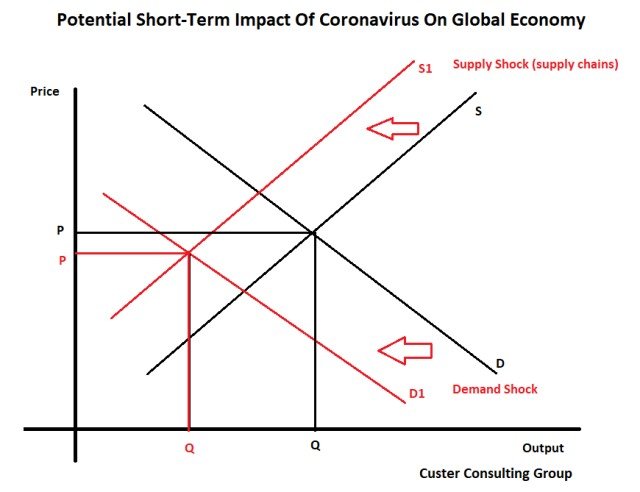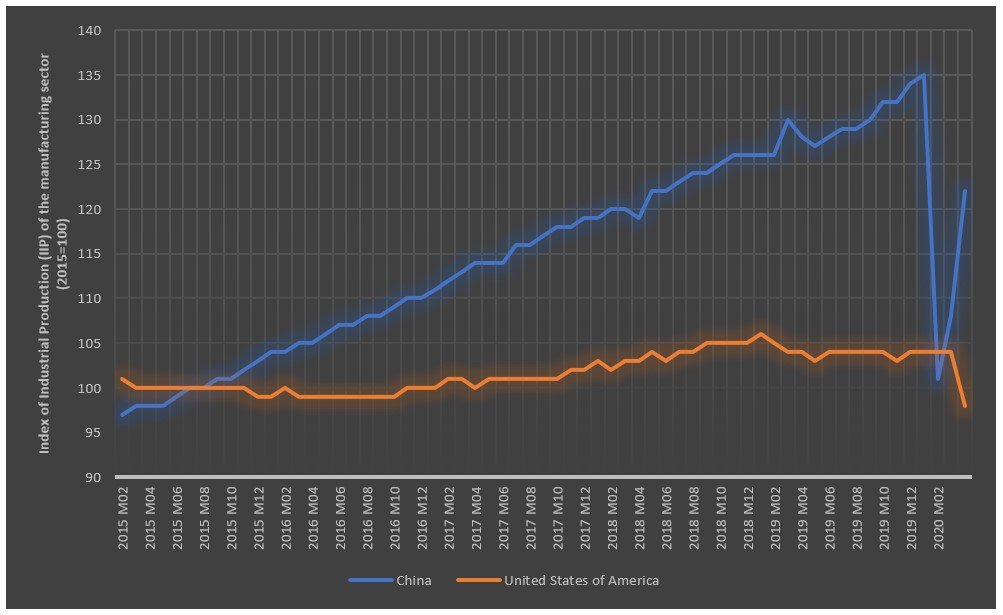INTRODUCTION
COVID-19, or more commonly known as the coronavirus, originating from Wuhan, China has forced many of the world’s economies into a period uncertainty. According to VOX, a widely recognized American news website, the virus outbreak has accounted for over 50% of output contractions within the corona-infected countries in the past 3 months. Furthermore, there has been an extensive decline in terms of consumption, exports and imports and investment.

The diagram states the potential short term impact on the global economy where both supply and demand have decreased.
COVID-19 AND THE WORLD
The IMF (International Monetary Fund) confirms that the pandemic is one of the worst recessions since the Great Depression (1929-1933). WTO predicts a decline in the economic growth rate by 9%. The United Nations forecasted a decrease by up to 1% in the global GDP value. Levels of poverty have increased up to a figure of 8.6% in 2020. Exports and imports are officially restricted which has caused many economies to act independently over the span of the pandemic. This means that these economies do not earn revenue from exports and do not offer a wider choice to consumers in terms of goods and service. Production levels have fallen as there are no workers to do their jobs. This has especially affected the global manufacturing sector which is illustrated as follows.

COVID-19 AND SRI LANKA
Sri Lanka despite being a small nation is one of the first countries to come close to the elimination of the virus. However tactfully the mitigation of the virus was consulted, the country still has to suffer the burden of economic downfall. One of the major problems that has occurred is the lack in tax and government revenue. This is mainly because of the decrease in tourism. Due to the regulation of foreign travel, Sri Lanka is incapable of earning revenue through tourism.
Businesses cannot afford to make a profit as employees cannot come to work. This has caused the secondary sector to experience a percentage decrease by up to 2%. Farmers and workers employed in the primary sector cannot contribute to the extraction of raw materials. Thus sustainability is severely low. Fitch Ratings states that these two sectors are the lowest compared to the other sectors of industry.
Inflation rates have increased. The rise in prices is due to the delivery services in terms of rations and other necessary goods. Most corporations are managed through online services. However, not every consumer can be consulted to their needs thus businesses receive negative feedback.
Due to the careful containment of the coronavirus, Sri Lanka is most likely to return to the rate of economic growth before the global pandemic occurred in approximately 12 to 18 months.
COVID-19. WHAT GOOD HAS IT DONE?
- Due to the lockdown, carbon dioxide levels have reduced by more than 50%. It is stated that this decrease is the lowest recorded in the last 50 years.
- Social distancing has slowed down the spread of the virus by a large amount.
- A vaccine is being made using the medicine provided to cure SARS.
- Crime rates have dropped immensely in many countries.
- Working from home encourages ideas and increases the workers’ motivation. This is because they are in a work space they are more comfortable with.
COVID-19 AND POLICIES TO OVERCOME THE RECESSION
To recover from the recession due to the pandemic, certain economic policies must be implemented. These should be short, medium or long depending on the economic situation of the country. To overcome the decline in the manufacturing sector, subsidies can be given off to businesses to improve the cash flow position and to pay wages to encourage a larger output and higher productivity. Tax rates (both direct and indirect) will have increase to support the growth of the economy. Interest rates can be decreased in order to encourage borrowing and investment to boost production and economic growth. The government can increase competition to promote efficiency and productivity hence increasing supply.


























